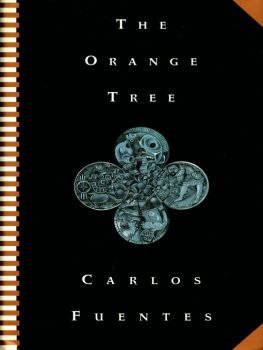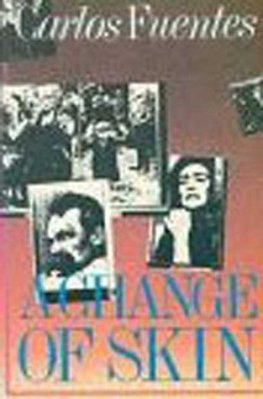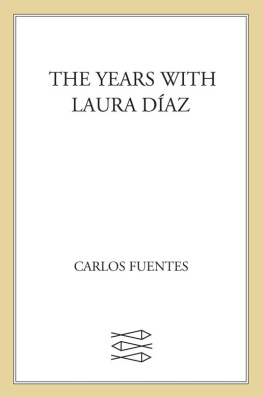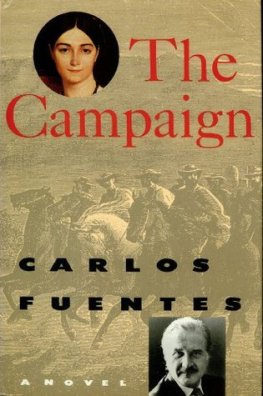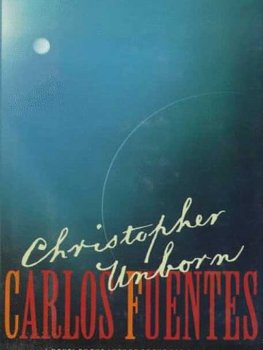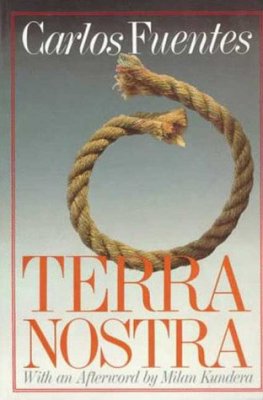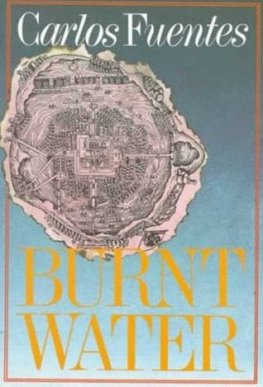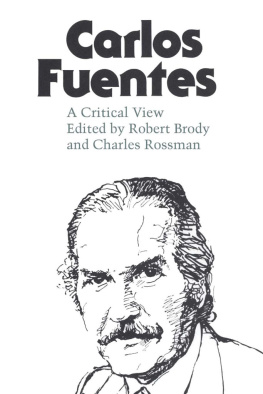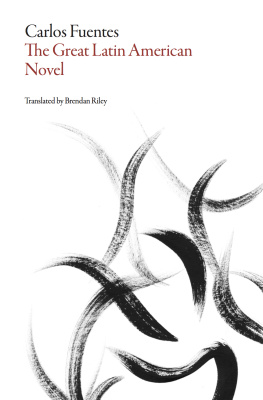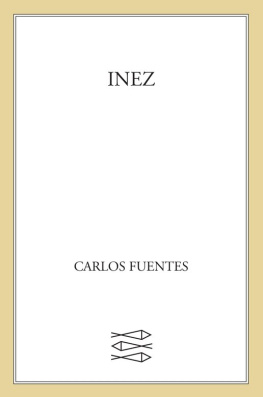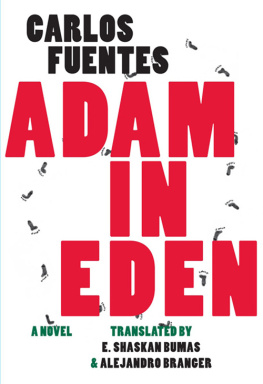Carlos Fuentes
The Orange Tree
Like the planets in their orbits, the world of ideas tends toward circularity.
AMOS OZ, Late Love
Combien de royaumes nous ignorent!
PASCAL, Penses
[10]
ALL this I saw. The fall of the great Aztec city in the moan of the conch shells, the clash of steel against flint, and the fire of Castilian cannon. I saw the burnt water of the lake where stood this Great Tenochtitln, two times the size of Crdoba.
The temples fell, the standards, the trophies. The very gods themselves fell. And the day after the defeat, using the stones of the Indian temples, we began to build the Christian churches. Anyone curious or who happens to be a mole will find at the base of the columns of the Cathedral of Mexico the magic emblems of the God of Night, the smoking mirror of Tezcatlipoca. How long will the new mansions of our one God, built on the ruins of the not one but thousand gods last? Perhaps as long as the name of these: Rain, Water, Wind, Fire, Garbage
To tell the truth, I dont know. I just died of buboes. A horrible death, painful, incurable. A bouquet of plagues bestowed upon me by my own Indian brothers in exchange for the evils we Spaniards visited on them. I am shocked to see this city of Mexico populated by faces scarred by smallpox, as devastated as the causeways of the conquered city all in the twinkling of an eye. The water of the lake heaves, boiling; the walls have contracted an incurable leprosy; the faces have forever lost their dark beauty, their perfect profile: for all time, Europe has marked the face of this New World, which, in fact, is older than the European face. Although to tell the truth, from this Olympian vantage point death has given me, I see everything thats happened as the meeting of two old worlds, both millenarian the stones weve found here are as old as those of Egypt, and the destiny of all empires was written for all time on the wall at Balthazars feast.
I saw it all. Id like to tell it all. But my appearances in history are rigorously limited to whats been said about me. The chronicler Bernal Daz del Castillo mentions me fifty-eight times in his True History of the Conquest of New Spain. The last thing known about me is that I was already dead when Hernn Corts, our commander, embarked on his ill-fated expedition to Honduras in October of 1524. Thats how the chronicler describes it, and he soon forgets about me.
True, I do reappear in the final parade of ghosts, when Bernal Daz lists the fates of the comrades of the conquest. The writer possesses a prodigious memory: he remembers every name, doesnt forget a single horse or who rode it. Perhaps he had no other recourse but memory to save himself from death. Or from something worse: disillusion and sadness. Lets not fool ourselves. No one escaped unscathed from this venture of discovery and conquest neither the conquered, who witnessed the destruction of their world, nor the conquerors, who never achieved the total satisfaction of their ambitions, suffering instead endless injustices and disenchantments. Both should have built a new world after their shared defeat. I can know that because Ive already died; the chronicler from Medina del Campo didnt know it very well when he wrote his fabulous history, which is why hes got more than enough memory and not enough imagination.
Not a single comrade of the conquest is missing from his list. But the vast majority are dispatched with a laconic epitaph: He died his death. Its true that some, very few, are singled out because they died in the power of the Indians. The most interesting are those who had a singular, almost always violent, fate.
Glory and abjection are equally evident in this affair of the conquest. Corts sentenced Pedro Escudero and Juan Cermeo to the gallows because they tried to escape to Cuba on a boat, while he only ordered their pilot, Gonzalo de Umbra, to have his toes cut off. Maimed and all, this Umbra had the effrontery to appear before the King and complain, obtaining thereby rents paid in gold and Indian townships. Corts must have regretted not having hanged him as well. Observe then, readers, listeners, penitents, or whatever you are as you approach my tomb, how decisions are made when time presses and history suppresses. Things could always have happened exactly opposite to the way the chronicle records them. Always.
But it also tells you that in this undertaking there was a bit of everything, from the personal pleasures of a certain Morn who was a great musician, a man named Porras with bright red hair who was a great singer, or an Ortiz who was a great cittern player and dancing master, to the disasters of Enrique something-or-other, a native of Palencia, who drowned from fatigue, the weight of his weapons, and the heat they caused him.
There are crossed destinies: Corts marries Alfonso de Grado to no less a personage than Doa Isabel, daughter of the Aztec emperor Moctezuma; at the same time, a certain Xurez, called the Old Man, ends up killing his wife with a corn-grinding stone. Who wins, who loses in a war of conquest? Juan Sedeo came with a fortune merely his own ship, a mare and a black to serve him, bacon, a good supply of cassava bread and made more here. A certain Burguillos, on the other hand, acquired wealth and good Indians, but he gave it all up to become a Franciscan. Most returned from the conquest or stayed on in Mexico without saving a single maraved.
So what can one more destiny my own matter in this parade of glory and misery? Ill merely say that in this matter of destinies, I think that the wisest of all of us was the man called Sols, Behind-the-Door, who spent his time in his house behind the door watching the others pass by in the street, not meddling with anyone and not being meddled with by anyone. Now I think that in death were all like Sols: behind the door, watching people pass by without being seen, and reading whats said about us in the chronicles written by the survivors.
About me, then, this is the final statement:
Another soldier, whose name was Jernimo de Aguilar, passed; I include Aguilar in this account because he was the man we found at Catoche Point, who was being held by Indians and who became our translator. He died crippled with buboes.
[9]
I have many final impressions of the great business of the conquest of Mexico, in which fewer than six hundred valiant Spaniards subdued an empire nine times larger than Spain in territory and three times larger in population. To say nothing of the fabulous treasure we found here, which, shipped to Cdiz and Seville, made the fortune not only of Spain but of the whole of Europe, for all time, right until today.
I, Jernimo de Aguilar, look at the New World before closing my eyes forever, and the last thing I see is the coast of Veracruz and the ships setting sail filled with Mexican treasure, guided by the most trustworthy of compasses: a sun of gold and a moon of silver, both simultaneously hanging over a blue-black sky that is stormy on high but bloody as soon as it touches the surface of the water.
I want to bid farewell to the world with this image of power and riches in the background of my vision: five well-stocked ships, a large number of soldiers, and many horses, shot, shotguns, crossbows, and all sorts of weapons, piled up to the masts and stored in the holds as ballast; eighty thousand pesos in gold and silver, infinite jewels, and the entire wardrobe of Moctezuma and Guatemuz, the last Mexican kings. A clean conquest operation, justified by the treasure a bold captain in the service of the Crown sends to His Majesty, King Charles.
But my eyes dont manage to close in peace, thinking above all about the abundance of protection, arms, men, and horses that accompanied the gold and silver of Mexico back to Spain a cruel contrast to the insecurity, slim resources, and small number of soldiers with which Corts and his men came from Cuba in the first moment of this dubious exploit. And yet, just look at the ironies of history.

